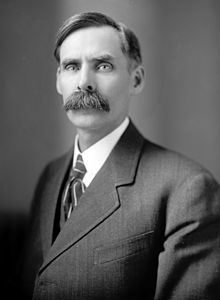Andrew Volstead
| Andrew Volstead | |
|---|---|
 |
|
| Member of the U.S. House of Representatives from Minnesota's 7th district |
|
|
In office March 4, 1903 – March 3, 1923 |
|
| Preceded by | Frank Eddy |
| Succeeded by | Ole J. Kvale |
| Personal details | |
| Born |
Andrew John Volstead October 31, 1860 Kenyon, Minnesota, United States |
| Died | January 20, 1947 (aged 86) Granite Falls, Minnesota, United States |
| Resting place | Granite Falls Cemetery |
| Political party | Republican |
| Profession | Law |
Andrew John Volstead (October 31, 1860 – January 20, 1947) was an American member of the United States House of Representatives from Minnesota, 1903–1923, and a member of the Republican Party. His name is closely associated with the National Prohibition Act of 1919, usually called the Volstead Act. The act was the enabling legislation for the enforcement of Prohibition in the United States beginning in 1920.
Volstead was born in Kenyon, Goodhue County, Minnesota, to Norwegian-American parents Jon Einertson Vraalstad (John Vrolstad), a distant relative of Queen Sonja of Norway, and wife Dorothea Mathea Lillo. He was educated at St. Olaf College, became a lawyer and served as mayor of Granite Falls, Minnesota, from 1900 to 1902.
While in Congress, he served as chairman of the House Judiciary Committee from 1919 to 1923. Although often considered the author of the Volstead Act, he collaborated with Wayne Wheeler of the Anti-Saloon League, who conceived and largely drafted the bill. However, Volstead sponsored the bill and championed, promoted and facilitated its passage. He also helped author the Capper-Volstead Act, which enabled farmers to form locally owned cooperatives without fear of prosecution under the Sherman Antitrust Act. The law is still in effect.
...
Wikipedia
